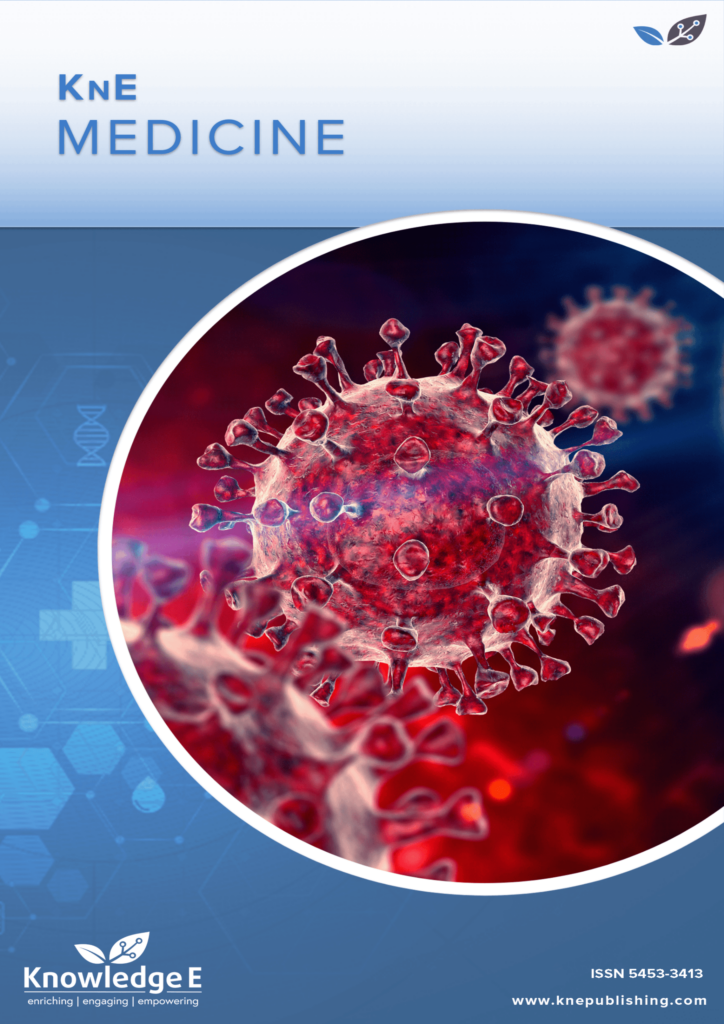
KnE Medicine
ISSN: 2519-125X
The latest conference proceedings on all fields of medicine.
Mothers' Knowledge and Self-efficacy on Preventing Infections in Low-birth-weight Infants during the COVID-19 Pandemic
Published date: Mar 08 2023
Journal Title: KnE Medicine
Issue title: 2nd International Conference on Medical Health Science (2nd ICMEDH)
Pages: 296–304
Authors:
Abstract:
Low birth weight (LBW) infants are at risk for vertical and horizontal transmission of COVID-19. A mother’s ability to prevent infection in LBW infants is decided by their knowledge, self-efficacy, and abilities of the mother in carrying out infection-prevention care. This study aimed to analyze the relationship between mothers’ knowledge and self-efficacy with their ability to prevent infection in LBW infants during the COVID-19 pandemic. This study used a correlational design. This study included 84 respondents who were selected through purposive sampling in the perinatology room. The statistical test used was the Spearman Rho. The outcomes confirmed a relationship between a mother’s knowledge (r = 0.249; p = 0.022) and self-efficacy (r = 0.313; p = 0.004) with the mother’s ability to prevent infection in LBW infants. The level of strength of the positive relationship between a mother’s knowledge and the mother’s ability to prevent infection in LBW infants is 0.249, or very vulnerable. The level of the strength of the positive relationship between maternal self-efficacy and the mother’s ability to prevent infection in LBW infants is 0.313, or sufficient. Therefore, increased knowledge and self-efficacy of mothers may have an impact on increasing the ability of mothers to prevent infection in LBW.
Keywords: knowledge, self-efficacy, ability to prevent infection, low birth weight, COVID-19 pandemic
References:
[1] Minckas N, Medvedev MM, Adejuyigbe EA, Brotherton H, Chellani H, Estifanos AS, et al.; COVID-19 Small and Sick Newborn Care Collaborative Group. Preterm care during the COVID-19 pandemic: A comparative risk analysis of neonatal deaths averted by kangaroo mother care versus mortality due to SARS-CoV-2 infection. EClinicalMedicine. 2021 Mar;33:100733.
[2] Auriti C, De Rose DU, Tzialla C, Caforio L, Ciccia M, Manzoni P, et al. Vertical Transmission of SARS-CoV-2 (COVID-19): Are Hypotheses More than Evidences? Am J Perinatol. 2020 Sep;37 S 02:S31–8.
[3] Cavicchiolo ME, Lolli E, Trevisanuto D, Baraldi E. Managing a tertiary-level NICU in the time of COVID-19: lessons learned from a high-risk zone. Pediatr Pulmonol. 2020 Jun;55(6):1308–10.
[4] Dong L, Tian J, He S, Zhu C, Wang J, Liu C, et al. Possible Vertical Transmission of SARS-CoV-2 From an Infected Mother to Her Newborn. JAMA. 2020 May;323(18):1846–8.
[5] Facchetti F, Bugatti M, Drera E, Tripodo C, Sartori E, Cancila V, et al. SARSCoV2 vertical transmission with adverse effects on the newborn revealed through integrated immunohistochemical, electron microscopy and molecular analyses of Placenta. EBioMedicine. 2020 Sep;59:102951.
[6] Lackey KA, Pace RM, Williams JE, Bode L, Donovan SM. SARS-CoV-2 and Human Milk: What is The Evidence?. 2020;1–22.
[7] Bäuerl C, Randazzo W, Sánchez G, Selma-Royo M, García Verdevio E, Martínez L, et al.; MilkCORONA study team. SARS-CoV-2 RNA and antibody detection in breast milk from a prospective multicentre study in Spain. Arch Dis Child Fetal Neonatal Ed. 2022 Mar;107(2):216–21.
[8] Groß R, Conzelmann C, Müller JA, Stenger S, Steinhart K, Kirchhoff F, et al. Detection of SARS-CoV-2 in human breastmilk. Lancet. 2020 Jun;395(10239):1757–8.
[9] Gale C, Quigley MA, Placzek A, Knight M, Ladhani S, Draper ES, et al. Characteristics and outcomes of neonatal SARS-CoV-2 infection in the UK: a prospective national cohort study using active surveillance. Lancet Child Adolesc Health. 2021 Feb;5(2):113–21.
[10] Gale C, Knight M, Ladhani S, Draper ES, Sharkey D. Doherty, Cora, Mactier H. National Active Surveillance to Understand and Inform Neonatal Care in COVID-19. Arch Child Fetal Neonatal. 2020;105:4.
[11] Cavicchiolo ME, Trevisanuto D, Lolli E, Mardegan V, Saieva AM, Franchin E, et al. Universal screening of high-risk neonates, parents, and staff at a neonatal intensive care unit during the SARS-CoV-2 pandemic. Eur J Pediatr. 2020 Dec;179(12):1949– 55.
[12] Astuti N, Devy E. Knowledge, Family Support and Self-Reliance Capital when Caring for Low Birth Weight Babies. J Ners. 2019;14(1):10–5.
[13] Sugiarti S, Rustina Y, Efendi D. Increasing the Knowledge and Confidence of Mothers in Caring for Low Birth Weight Babies Through Education from the Maternal and Child Health Handbook. J Keperawatan Soedirman. 2020;15(2). https://doi.org/10.20884/1.jks.2020.15.2.1160.
[14] Mohamad MM, Sulaiman NL, Sern LC, Salleh KM. Measuring the Validity and Reliability of Research Instruments. Procedia Soc Behav Sci. 2014 Nov;2015(204):164–71.
[15] Gibaud-Wallston J, Wandersman LP. The Parenting Sense of Competence Scale. Handb Fam Meas Tech. 2001;3:315.
[16] Dowling H. Parental Self-Efficacy in Early Years Parenting. Thesis. Faculty of Medical and Human Sciences, University of Manchester. 2014;164.
[17] Mousavi SS, Chaman R, Mohagheghi P, Mousavi SA, Khosravi A, Keramat A. Mousavi, Seyed Abbas, Khosravi A, Keramat A. Development of a support system for parents of premature infants. Iran J Pediatr. 2017;27(6). https://doi.org/10.5812/ijp.9578.
[18] Aldirawi A, El-Khateeb A, Mustafa AA, Abuzerr S. Mothers’ Knowledge of Health Caring for Premature Infants after Discharge from Neonatal Intensive Care Units in the Gaza Strip, Palestine. Open J Pediatr. 2019;09(03):239–52.
[19] Sims DC, Skarbek AJ. Parental Self-Efficacy: A Concept Analysis Related to Teen Parenting and Implications for School Nurses. J Sch Nurs. 2019 Feb;35(1):8–14.
[20] Hess CR, Teti DM, Hussey-Gardner B. Self-efficacy and parenting of high-risk infants: the moderating role of parent knowledge of infant development. J Appl Dev Psychol. 2004;25(4):423–37.
[21] WHO. COVID-19 Strategy Update. COVID-19 Strategy Update 14th April 2020. 2020.
[22] Litmanovitz I, Silberstein D, Butler S, Vittner D. Care of hospitalized infants and their families during the COVID-19 pandemic: an international survey. J Perinatol. 2021 May;41(5):981–7.
[23] Green J, Petty J, Bromley P, Walker K, Jones L. COVID-19 in babies: knowledge for neonatal care. J Neonatal Nurs. 2020 Oct;26(5):239–46.
[24] World Health Organization (WHO). Recommendations to Member States to improve hand hygiene practices to help prevent the transmission of the COVID-19 virus. World Health Organ. 2020;1(April):1–3.
[25] Liyana Amin NA, Tam WW, Shorey S. Enhancing first-time parents’ self-efficacy: A systematic review and meta-analysis of universal parent education interventions’ efficacy. Int J Nurs Stud. 2018 Jun;82:149–62.
